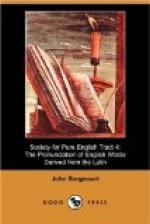I am mis[’a]nthr[)o]pos and hate mankind.
Of course all scholars shortened the first vowel of the word, and doubtless Shakespeare shortened also the third. Busby also thus spoke Greek with the result that Dryden in later life sometimes wrote epsilon instead of eta and also spoke of ‘Cleom[’e]nes’ and ‘Iphig[=e]n[)i]a’. As a boy at Westminster he wrote
Learn’d, Vertuous, Pious, Great,
and have by this
An universal Metempsuchosis.
Macaulay with an ignorance very unusual in him rebuked his nephew for saying ‘metam[’o]rph[)o]sis’, and Dr. Johnson, had he been living, would have rebuked Macaulay. For the sake of our poets we ought to save ‘apoth[’e][)o]sis’, which is in some danger. Garth may perhaps be forgotten,
Allots the prince of his celestial line
An Apotheosis and rights divine,
but ‘Rejected Addresses’ should still carry weight. In the burlesque couplet, ascribed in the first edition to the younger Colman and afterwards transferred to Theodore Hook, we have
That John and Mrs. Bull from ale and tea-houses
May shout huzza for Punch’s apotheosis.
It need hardly be said that ‘tea-houses’ like ‘grandfathers’ has the stress on the antepenultimate.
There are other words of Greek origin which now break the rules, though I believe the infringement to be quite modern. First we have the class beginning with proto. It can hardly be doubted that our ancestors followed rule and said ‘pr[)o]tocol’, and ‘pr[)o]totype’, and I suspect also ‘pr[)o]tomartyr’. There seems, however, to be a general agreement nowadays to keep the Greek omega. As for ‘protagonist’ the word is so technical and is often so ludicrously misunderstood that writers on the Greek drama would do well to retain the Greek termination and say ‘protagonistes’; for ‘protagonist’ is very commonly mistaken and used for the opposite of ‘antagonist’.
Next come words beginning with hypo or hyph. In a disyllable the vowel is long by the ‘apex’ rule, as in ‘hyphen’. In longer words it should be short. So once it was, and we still say ‘hypocaust’, ‘hypocrit’, ‘hypochondria’ (whence ’hypped’), ‘hypothesis’, and others, but a large group of technical and scientific words seems determined to have a long y. It looks as though there were a belief that y is naturally long, though the French influence which gives us ‘t[=y]rant’ does not extend to ‘tyranny’. I do not know what Mr. Hardy calls his poem, but I hope he follows the old use and calls it ’The D[)y]nasts’. It might be thought that ‘d[)y]nasty’ was safe, but it is not. Some modern words like ‘dynamite’ have been misused from their birth.
Another class begins with hydro- from the Greek word for water. None of them seem to be very old, but probably ‘hydraulic’ began life with a short y. Surely Mrs. Malaprop, when she meant ‘hysterics’ and said ‘hydrostatics’, must have used the short y. Of course ‘hydra’ which comes from the same root follows the ‘apex’ rule.




